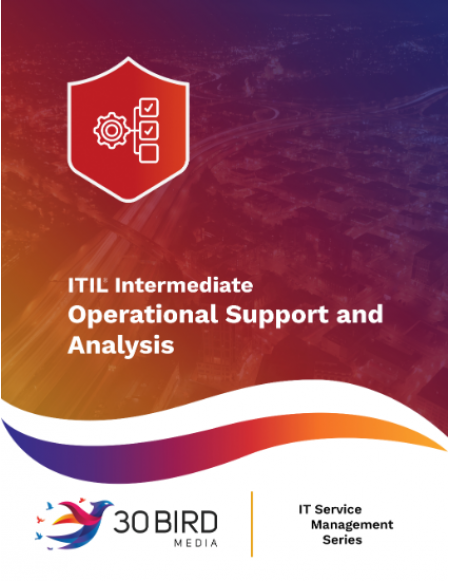Chapter 1: Introduction
The value to the business of OSA activities
The context of OSA activities within the service lifecycle
How OSA activities support the service lifecycle
Optimizing service operation performance
Chapter 2: Event Management
The purpose and objectives of the event management process
The scope of the event management process
The value to business and to the service lifecycle
The policies, principles and basic concepts of event management
Designing for event management
Use of event rule sets and correlation engines
The process activities, methods and techniques that enable this process and how it relates to the service lifecycle
The triggers, inputs and outputs, and interfaces
Information management within the event management process
How critical success factors and key performance indicators can be used to check effectiveness and efficiency of the event management process
The challenges and risks associated with the event management process
Chapter 3: Incident Management
The purpose and objectives of the incident management process
The scope of the incident management process
The value to business and to the service lifecycle
The policies, principles and basic concepts of incident management
The process activities, methods and techniques and how they relate to the service lifecycle
The triggers, inputs and outputs and the interfaces
Information management within the incident management process
How critical success factors and key performance indicators can be used to check the effectiveness and efficiency of the incident management process
The challenges and risks associated with the incident management process
Chapter 4: Request fulfillment
The purpose and objectives of the request fulfillment process
The scope of the request fulfillment process
The value to business and to the service lifecycle
The policies and principles of request fulfilment and the request model concept
The process activities, methods and techniques and how they relate to the service lifecycle
The triggers, inputs and outputs and interfaces
Information management within the request fulfillment process
How critical success factors and key performance indicators can be used to check effectiveness and efficiency of the request fulfillment process
The challenges and risks associated with the request fulfillment process
Chapter 5: Problem management
The purpose and objectives of the problem management process
The scope of the problem management process
The value to business and service lifecycle
The policies, principles and basic concepts of problem management and the problem model concept
Problem Analysis techniques and error detection in development environments
The process activities, methods and techniques and how they relate to the service lifecycle
The triggers, inputs and outputs, and interfaces
Information management within the problem management process
How critical success factors and key performance indicators can be used to check efficiency of the problem management process
The challenges and risks associated with the problem management process
Chapter 6: Access Management
The purpose and objectives of the access management process
The scope of the access management process
The value to business and service lifecycle
The policies, principles and basic concepts of access management
The process activities, methods and techniques and how they relate to the service lifecycle
The triggers, inputs and outputs, and interfaces
Information management within the access management process
How critical success factors and key performance indicators can be used to check effectiveness and efficiency of the access management process
The challenges and risks associated with the access management process
Chapter 7: The service desk
The purpose and role of service desk
The service desk objectives
Different service desk organization structures
Different service desk staffing options
Measuring service desk performance
Issues and safeguards to consider when outsourcing the service desk
Chapter 8: Common OSA functions and roles
The roles within each function
The roles within each OSA process
The objectives of each function
The activities of each function
Chapter 9: Technology and implementation considerations
The generic requirements for technology to support process capability
The evaluation criteria for technology and tools for process implementation
Project, risk and staffing practices for process implementation
The challenges, risks and CSFs related to implementing practices and processes
How to plan and implement service management technologies
ITIL Operational Support and Analysis focuses on the practical application of OSA practices in order to enable event, incident, request, problem, access, technical, IT operations and application management. OSA also covers issues relating to the people, relationships, procedures and infrastructure technology required to ensure that the organization or program can provide the high quality and cost effective IT services that are required to meet organizational needs.
To request the PowerPoints for this course, please e-mail sales@30bird.com.

